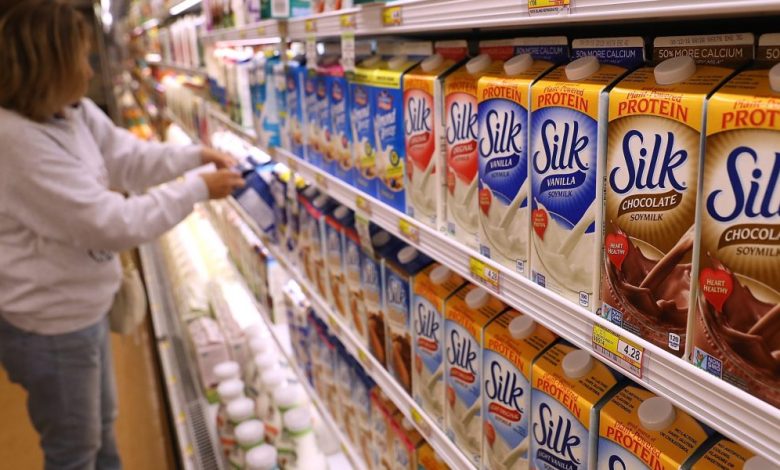Soy, oat and almond drinks could be labeled milk, per FDA proposal

Soy, oat, almond and other beverages that label themselves “milk” can continue to use the name, according to draft federal rules released Wednesday.
Food and Drug Administration officials issued a guideline stating that plant-based beverages do not purport to be derived from dairy animals — and that US consumers are not confused by the difference.
Dairy producers have been asking the FDA for years to crack down on plant-based beverages and other products they say masquerade as animal-based foods and obscure the true meaning of “dairy.”
According to the draft rule, the agency recommends beverage manufacturers to clearly label their products with the plant-based origin of the food, such as “soy milk” or “cashew milk.”
The rules also provide for voluntary supplemental nutritional labels, indicating when the drinks have lower levels of nutrients than milk, such as: B. calcium, magnesium or vitamin D. They would still allow labels indicating when plant-based beverages have higher levels. Fortified soy milk is the only plant-based food to be included in the milk category of the US Dietary Guidelines for its nutritional content.
The new guidelines aim to provide consumers with clear nutritional information, said FDA Commissioner Dr. Robert Califf in a statement. The draft regulations do not apply to non-dairy products other than beverages such as yoghurt.
The National Milk Producers Federation, an industry trade group, welcomed the call for additional nutritional information on beverage labels but said they disagree with the FDA’s conclusion that plant-based beverages can be labeled as milk because it is a “common and usual names”.
The Good Food Institute, a group that advocates plant-based products, rejected the additional labeling in a statement, saying that “the guidance erroneously admonishes companies to make a direct comparison” with cow’s milk, even though essential nutrients are already listed .
In recent years, the number of plant-based drinks has exploded and includes dozens of varieties, including cashew-, coconut-, hemp-, and quinoa-based drinks. Although the drinks are made from the liquid extracts of plant materials, they are often referred to – and described as – “milk.”
In the US, almond milk is the most popular variety, but oat milk is seeing the fastest growth. Still, non-dairy sales are dwarfed by traditional milk. Sales of refrigerated cow’s milk grew to $12.3 billion in the 52 weeks ended Jan. 28, compared to $2.5 billion for plant-based milk, according to NielsenIQ.
In the past, legislators in dairy states have attempted to pass legislation that would require the FDA to enforce a federal standard that defines “milk” as the product of “milking one or more healthy cows.”
The agency is accepting comments on the draft guidelines until April 23.
Learn how to navigate and build trust in your organization with The Trust Factor, a weekly newsletter exploring what leaders need to succeed. Login here.



